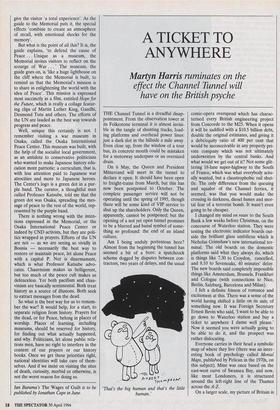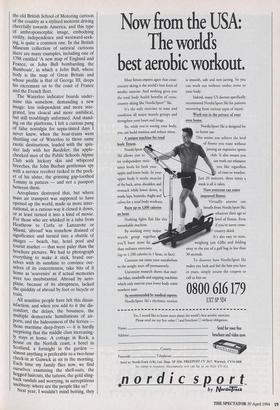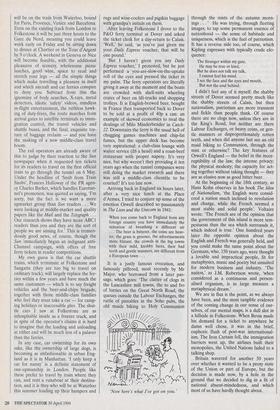A TICKET TO ANYWHERE
Marlyn Harris ruminates on the
effect the Channel Tunnel will have on the British psyche
THE Channel Tunnel is a dreadful disap- pointment. From the observation tower at its Folkestone terminal it is almost invisi- ble in the tangle of shunting tracks, load- ing platforms and overhead power lines: just a dark slot in the hillside a mile away. Even close up, from the window of a tour bus, its concrete mouth could be mistaken for a motorway underpass or an oversized drain.
On 6 May, the Queen and President Mitterrand will meet in the tunnel to declare it open. It should have been open to freight-trains from March, but this has now been postponed to October. The complete passenger service will not be operating until the spring of 1995, though there will be some kind of VIP service to shut up the shareholders. Only the Queen, apparently, cannot be postponed; but the opening of a not yet open tunnel promises to be a blurred and banal symbol of some- thing so profound: the end of an island culture.
Am I being unduly portentous here? Almost from the beginning the tunnel has seemed a bit of a bore: a spatchcock scheme dogged by disputes between con- tractors, two years of delays, and the usual 'That's the big human and that's the little human.' comic-opera overspend which has charac- teiised every British engineering project from Concorde to the M25. When it opens it will be saddled with a $10.5 billion debt, double the original estimates, and giving it a debt/equity ratio of 400 per cent that would be inconceivable in any properly pri- vate company which was not ultimately underwritten by the central banks. And what would we get out of it? Not some glit- tering 18-lane super-highway to the South of France, which was what everybody actu- ally wanted, but a claustrophobic rail shut- tle. The only difference from the queuing and squalor of the Channel ferries, it seemed, was that you would make the crossing in darkness, diesel fumes and mor- tal fear of a terrorist bomb. It wasn't even going to be cheaper.
I changed my mind en route to the South Bank a few weeks before Christmas, on the concourse of Waterloo station. They were testing the electronic indicator boards out- side the brilliant glass umbilicus which is Nicholas Grimshaw's new international ter- minal. The old boards on the domestic platforms said what they always do, which is things like 7.30 to Croydon, cancelled, and 8.10 to Sevenoaks, 40 minutes' delay. The new boards said completely impossible things like Amsterdam, Brussels, Frankfurt and Cologne (with connections to Nice, Berlin, Salzburg, Barcelona and Milan).
I felt a definite frisson of romance and excitement at this. There was a sense of the world having shifted a little on its axis; of something new. It was Foreign Secretary Ernest Bevin who said, '1 want to be able to go down to Waterloo station and buy a ticket to anywhere I damn well please.' Now it seemed you were actually going to be able to do it, and the prospect was rather dislocating.
Everyone carries in their head a symbolic map of where they live (there was an inter- esting book of psychology called Mental Maps, published by Pelican in the 1970s, on this subject). Mine was once based on the east-west curve of Swansea Bay, and now, like most Londoners, it is structured around the left-right line of the Thames across the A-Z.
On a larger scale, my picture of Britain is the old British School of Motoring cartoon of the country as a stylised motorist driving cheerfully towards America, and this type of anthropomorphic image, embodying virility, independence and westward-seek- ing, is quite a common one. In the British Museum collection of satirical cartoons there are many examples, including one of 1798 entitled `A new map of England and France, or John Bull bombarding the Bumboats', in which a John Bull, whose body is the map of Great Britain and whose profile is that of George III, drops his excrement on to the coast of France and the French fleet.
The Waterloo indicator boards under- mine this somehow, demanding a new image: less independent and more inte- grated, less cloacal and more umbilical, but still troublingly unformed. And stand- ing on the platforms, I felt a curious pang of false nostalgia for sepia-tinted days I never knew, when the boat-trains went shuttling out of Waterloo to those same exotic destinations, loaded with the spin- ster lady with her Baedeker, the apple- cheeked men of the Public Schools Alpine Club with hickory skis and whipcord breeches, the John Buchan gentleman spy With a service revolver tucked in the pock- et of his ulster, the grinning gap-toothed Tommy in puttees — and not a passport between them.
Aeroplanes destroyed that, but where mass air transport was supposed to have Opened up the world, made us more inter- national, in a curious way it closed it down, or at least turned it into a kind of movie. For those who are whisked in a tube from Heathrow to Corfu or Lanzarote or Miami, 'abroad' was somehow drained of Significance and turned into a shuttle of images — beach, bar, hotel pool and tourist market — that were paler than the brochure pictures. We had to photograph everything to make it stick, brand our- selves with its sunshine to convince our- selves of its concreteness, take bits of it home as 'souvenirs' as if actual memories were too insubstantial. Abroad by aero- plane, because of its abruptness, lacked the quiddity of abroad by foot or bicycle or train.
All sensitive people have felt this dissat- isfaction, and when you add to it the dis- comfort, the delays, the bossiness, the multiple democratic humiliations of air- Ports, and the hideousness of the ferries — those maritime deep-fryers — it is hardly surprising that the middle class increasing- ly stays at home. A cottage in Rock, a house on the Norfolk coast, a hotel in Scotland, a fortnight in the garden — almost anything is preferable to a two-hour check-in at Gatwick at six in the morning. Each time my family flies now, we find ourselves examining the shell-suits, the hogged haircuts, the tattoos, the gold sling- back sandals and worrying, in surreptitious snobbery: where are the people like us?
Next year, I wouldn't mind betting, they will be on the train from Waterloo, bound for Paris, Provence, Venice and Barcelona. Even on the existing track from London to Folkestone it will be just three hours to the Gare du Nord, meaning you could leave work early on Friday and be sitting down to dinner at Chartier or the Tour d'Argent by 9 o'clock. A weekend in Geneva or Nice will become feasible, with the additional pleasures of scenery, wholesome picnic lunches, good wine, space to read and stretch your legs — all the simple things which make travelling a pleasure in itself and which aircraft and car ferries conspire to deny you. Subtract from this the ignominy of body searches, X-rays, metal detectors, idiotic 'safety' videos, mindless in-flight entertainment, the ruthless hawk- ing of duty-frees, the route marches from arrival gates to satellite terminals to immi- gration control, the transit vehicles and shuttle buses, and the final, exquisite tor- ture of baggage reclaim — and you have the making of a new middle-class travel boom.
The rail operators are already aware of this to judge by their reaction to the Sun newspaper when it requested ten tickets for its readers to travel on the first official train to go through the tunnel on 6 May. Under the headline of 'Snub from Train Snobs', Frances Holloway of the PR agen- cy Charles Barker, which handles Eurotun- nel's promotion, was quoted as saying, 'I'm sorry, but the fact is we want a more upmarket group than Sun readers. . . We were looking at middle-market and quality papers like the Mail and the Telegraph . . . Our research shows they have more ABC1 readers than you and they are the sort of people we are aiming for.' This is tremen- dously good news, of course, though the Sun immediately began an indignant anti- Chunnel campaign, with offers of free ferry tickets in reader competitions.
My own guess is that the car shuttle trains, which terminate at Folkestone and Sangatte (they are too big to travel on ordinary track), will largely replace the fer- ries within a few years and have much the same customers — which is to say freight vehicles and the beer-and-chips brigade, together with those middle-class families who feel they must take a car — for camp- ing holidays or inaccessible gites. The shut- tle cars I saw at Folkestone are as inhospitable inside as a freezer truck, and in spite of the operator's claims it is hard to imagine that the loading and unloading at either end will be much less of a palaver than the ferries.
In any case, car ownership for its own sake, like the ownership of large dogs, is becoming as unfashionable in urban Eng- land as it is in Manhattan. 'I only keep a car for nanny' is a definite statement of one-upmanship in London. People like these prefer to travel by train where they can, and rent a runabout at their destina- tion, and it is they who will be at Waterloo this summer loading up their hampers and rugs and wine-coolers and pigskin baggage with grandpa's initials on them.
After leaving Folkestone I drove to the P&O ferry terminal at Dover and asked the ticket clerk for a day-return to Calais. 'Well,' he said, 'as you've just given me your Daily Express voucher, that will be one pound.'
'But I haven't given you any Daily Express voucher,' I protested, but he just performed a you-are-slow-on-the-uptake roll of the eyes and pressed the ticket in my palm. The ferry operators are literally giving it away at the moment and the boats are crowded with shell-suits wheeling crates of beer on lift-trucks and shopping trolleys. It is English-brewed beer, bought in France then transported back to Dover to be sold at a profit of 40p a can: an example of skewed economics to rival the dealings of Milo Minderbender in Catch- 22. Downstairs the ferry is the usual hell of chugging games machines and chip-fat fumes, but the upper deck has become very aspirational: a club-class lounge with waiter service (£6 a head) and a roast-beef restaurant with proper napery. It's very nice, but why weren't they providing it ten years ago when the tunnel companies were still doing the market research and there was still a middle-class clientele to be courted? It's too late now.
Arriving back in England six hours later, after a very nice lunch at the Place d'Armes, I tried to conjure up some of the emotion Orwell described so passionately in The Lion and the Unicorn in 1941:
When you come back to England from any foreign country you have immediately the sensation of breathing a different air . The beer is bitterer, the coins are heav- ier, the grass is greener, the advertisements more blatant, the crowds in the big towns with their mild, knobby faces, their bad teeth and gentle manners, are different from a European town .. .
It is a justly famous evocation, and famously pilfered, most recently by Mr Major, who borrowed from a later pas- sage, which goes: 'The clatter of clogs in the Lancashire mill towns, the to and fro of lorries on the Great North Road, the queues outside the Labour Exchanges, the rattle of pintables in the Soho pubs, the old maids biking to Holy Communion 'Now here's what I've got on you.' through the mists of the autumn morn- ings . . . ' He was trying, through fleeting images, to tap some permanent essence of nationhood — the sense of habitude and uniqueness, which is the fuel of patriotism. It has a reverse side too, of course, which 1Cipling expresses with typically crude elo- quence:
The Stranger within my gate, He may be true or kind, But he does not talk my talk, 1 cannot feel his mind.
I see the face and the eyes and mouth, But not the soul behind.
I didn't feel any of it myself: the shabby streets of Dover seemed pretty much like the shabby streets of Calais, but then nationalism, patriotism are more transient and fickle than people think. Of course there are no clogs now, unless they are in the King's Road, but neither are there Labour Exchanges, or heavy coins, or gen- tle manners or disproportionately rotten teeth, and when did anyone last see an old maid biking to Communion, through the mist or otherwise? The key features of Orwell's England — the belief in the incor- ruptibility of the law; the intense privacy; the physical modesty; the capacity for act- ing together without taking thought — they are as elusive now as good bitter beer.
At the beginning of the 18th century, as Hans Kohn observes in his book The Idea of Nationalism, 'the English were consid- ered a nation much inclined to revolution and change, while the French seemed a most stable and solid people'. Voltaire wrote: 'The French are of the opinion that the government of this island is more tem- pestuous than the sea which surrounds it, which indeed is true.' One hundred years later the opposite opinion about the English and French was generally held, and you could make the same point about the Germans, who, 150 years ago, were thought a lovable and impractical people, fit for metaphysics, music and poetry but unsuited for modern business and industry. 'The nation,' as J.M. Robertson wrote, 'when considered as a continuous and person- alised organism, is in large measure a metaphysical dream.'
We are in flux is the point, as we always have been, and the most tangible evidence of the coming change in our sense of our- selves, of our mental maps, is a dull slot in a hillside in Folkestone. When Bevin made his demand for a ticket to anywhere he damn well chose, it was in the brief, euphoric flush of post-war international- ism. The Iron Curtain fell, the immigration barriers went up, the airlines built their monopolies, the United Nations faded to a talking shop.
Britain wavered for another 50 years over whether it wanted to be a proxy state of the Union or part of Europe, but the decision is made now, by a hole in the ground that we decided to dig in a fit of national absent-mindedness, and which most of us have hardly thought about.




























































 Previous page
Previous page